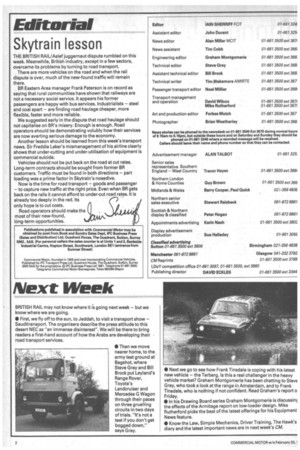Skytrain lesson
Page 2

If you've noticed an error in this article please click here to report it so we can fix it.
THE BRITISH RAIL/Aslef juggernaut dispute rumbled on this week. Meanwhile, British industry, except in a few sectors, overcame its problems by turning to road transport.
There are more vehicles on the road and when the rail dispute is over, much of the new-found traffic will remain there.
BR Eastern Area manager Frank Paterson is on record as saying that rural communities have shown that railways are not a necessary social service. It appears his former passengers are happy with bus services. Industrialists — steel and coal apart — are finding road haulage cheaper, more flexible, faster and more reliable.
We suggested early in the dispute that road haulage should not capitalise on BR's misery. Enough is enough. Road operators should be demonstrating volubly how their services are now averting serious damage to the economy.
Another lesson should be learned from this week's transport news. Sir Freddie Laker's mismanagement of his airline clearly shows that under-cutting and under-utilisation of equipment is commercial suicide.
Vehicles should not be put back on the road at cut rates. Long-term contracts should be sought from former BR customers. Traffic must be found in both directions — part loading was a prime factor in Skytrain's nosedive.
Now is the time for road transport — goods and passenger — to capture new traffic at the right price. Even when BR gets back on the rails it cannot afford to under-cut road rates. It is already too deeply in the red. Its only hope is to cut costs.
Road operators should make the most of their new-found, long-term opportunities.


















































